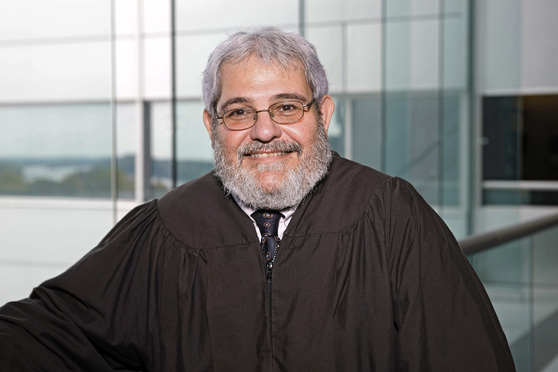Court, Voiding Sex Crime Confession, Urges More Use of Interpreters by Law Enforcement
"This case ... illustrates the difference between knowing a foreign language and being able to accurately and completely interpret the critically important words spoken by a witness in the course of an interrogation," the court said.
January 24, 2018 at 01:39 PM
4 minute read
 Appellate Division Judge Jose Fuentes
Appellate Division Judge Jose Fuentes A New Jersey appeals court has ruled that police and prosecutors need to take greater care in ensuring that non-English-speaking defendants clearly understand their right to decline interrogation, and reiterated that the state has a “heavy burden” of proving beyond a reasonable doubt that defendants knowingly and willingly give up to right to remain silent.
The three-judge Appellate Division panel, in a published ruling in State v. A.M., voided a Mexican native's plea to a sexual assault charge and six-year sentence because it was not clear that the defendant knew what he was doing when he waived his Miranda rights in admitting to inappropriately touching his step-granddaughter.
Appellate Division Judge Jose Fuentes, joined by Judges Harry Carroll and Greta Gooden-Brown, said it was unclear whether the Spanish-speaking police officer and a clerk who transcribed the taped interrogation, both with Hispanic surnames, were actually fluent in Spanish, and whether the defendant was literate even in his native language.
“This case … illustrates the difference between knowing a foreign language and being able to accurately and completely interpret the critically important words spoken by a witness in the course of an interrogation,” Fuentes wrote.
“The mere fact of having a Spanish last name does not create a rational basis to infer anything about a person's linguistic abilities,” Fuentes added.
Fuentes also wrote a separate concurring opinion in which he urged the state to take greater steps to ensure that properly trained interpreters are available to translate defendants' constitutional rights when they do not speak English.
The case involves a man, identified only as A.M., who was arrested by police in Bergenfield and indicted for sexually assaulting his 14-year-old step-granddaughter. The defendant spoke little or no English, according to the decision.
The police turned to one of its officers, Richard Ramos, who grew up in a Spanish-speaking household, to act as an interpreter. Ramos and A.M. spoke in Spanish and, at Ramos' urging, A.M. waived his right to remain silent and admitted that he inappropriately touched the girl, the court said.
Later, a trial judge in Bergen County denied A.M.'s motion to suppress his statement. He pleaded guilty to a sexual assault charge and was sentenced to six years in prison. He then appealed.
Fuentes, in reversing, said there was no showing that prosecutors properly met their “heavy burden” of proving, as required under the state Supreme Court's 2009 ruling in State v. Yohnnson, that A.M. knowingly and willing waived his Miranda rights.
“The judge found that 'nothing in the record suggests that the waiver was made under duress, coercion or intimidation.' We disagree,” Fuentes said. He noted that Ramos admitted during testimony that he paraphrased some of A.M.'s responses, and that the clerk who transcribed the interrogation had no proper training.
“The judge's analysis improperly shifts the burden of proof to defendant to alert the interrogating officers about any difficulty he may be having in understanding the ramifications of a legal waiver,” Fuentes said. “The judge assumed that defendant was literate in Spanish without a proper evidential foundation.”
in his concurring opinion, Fuentes said the judiciary could not mandate that law enforcement agencies use properly trained interpreters during interrogations of non-English-speaking defendants, but he urged the Attorney General's Office to develop guidelines for police departments to follow.
“Until this issue is addressed in a uniform manner befitting its importance, the constitutional right against self-incrimination of limited English proficient suspects remains on how well trained, presumptively partial individuals interpret the interrogator's questions and the suspects' answers,” Fuentes said.
A.M.'s attorney, Jane Personette, of the law office of Brian Neary in Hackensack said the ruling “demonstrates the importance of language and that translations be obtained in an impartial manner.
A spokesperson for the Bergen County Prosecutor's Office was not immediately available for comment.
This content has been archived. It is available through our partners, LexisNexis® and Bloomberg Law.
To view this content, please continue to their sites.
Not a Lexis Subscriber?
Subscribe Now
Not a Bloomberg Law Subscriber?
Subscribe Now
NOT FOR REPRINT
© 2025 ALM Global, LLC, All Rights Reserved. Request academic re-use from www.copyright.com. All other uses, submit a request to [email protected]. For more information visit Asset & Logo Licensing.
You Might Like
View All
‘The Decision Will Help Others’: NJ Supreme Court Reverses Appellate Div. in OPRA Claim Over Body-Worn Camera Footage
5 minute read
Longtime AOC Director Glenn Grant to Step Down, Assignment Judge to Take Over
4 minute read
Appellate Division Tosses Challenge to Rutgers Board Members That Ensnared NJ Lawyer
5 minute read
On the Move and After Hours: Einhorn Barbarito; Hartmann Doherty; Lowenstein Sandler; Lindabury McCormick
5 minute readTrending Stories
- 1Decision of the Day: Judge Dismisses Defamation Suit by New York Philharmonic Oboist Accused of Sexual Misconduct
- 2California Court Denies Apple's Motion to Strike Allegations in Gender Bias Class Action
- 3US DOJ Threatens to Prosecute Local Officials Who Don't Aid Immigration Enforcement
- 4Kirkland Is Entering a New Market. Will Its Rates Get a Warm Welcome?
- 5African Law Firm Investigated Over ‘AI-Generated’ Case References
Who Got The Work
J. Brugh Lower of Gibbons has entered an appearance for industrial equipment supplier Devco Corporation in a pending trademark infringement lawsuit. The suit, accusing the defendant of selling knock-off Graco products, was filed Dec. 18 in New Jersey District Court by Rivkin Radler on behalf of Graco Inc. and Graco Minnesota. The case, assigned to U.S. District Judge Zahid N. Quraishi, is 3:24-cv-11294, Graco Inc. et al v. Devco Corporation.
Who Got The Work
Rebecca Maller-Stein and Kent A. Yalowitz of Arnold & Porter Kaye Scholer have entered their appearances for Hanaco Venture Capital and its executives, Lior Prosor and David Frankel, in a pending securities lawsuit. The action, filed on Dec. 24 in New York Southern District Court by Zell, Aron & Co. on behalf of Goldeneye Advisors, accuses the defendants of negligently and fraudulently managing the plaintiff's $1 million investment. The case, assigned to U.S. District Judge Vernon S. Broderick, is 1:24-cv-09918, Goldeneye Advisors, LLC v. Hanaco Venture Capital, Ltd. et al.
Who Got The Work
Attorneys from A&O Shearman has stepped in as defense counsel for Toronto-Dominion Bank and other defendants in a pending securities class action. The suit, filed Dec. 11 in New York Southern District Court by Bleichmar Fonti & Auld, accuses the defendants of concealing the bank's 'pervasive' deficiencies in regards to its compliance with the Bank Secrecy Act and the quality of its anti-money laundering controls. The case, assigned to U.S. District Judge Arun Subramanian, is 1:24-cv-09445, Gonzalez v. The Toronto-Dominion Bank et al.
Who Got The Work
Crown Castle International, a Pennsylvania company providing shared communications infrastructure, has turned to Luke D. Wolf of Gordon Rees Scully Mansukhani to fend off a pending breach-of-contract lawsuit. The court action, filed Nov. 25 in Michigan Eastern District Court by Hooper Hathaway PC on behalf of The Town Residences LLC, accuses Crown Castle of failing to transfer approximately $30,000 in utility payments from T-Mobile in breach of a roof-top lease and assignment agreement. The case, assigned to U.S. District Judge Susan K. Declercq, is 2:24-cv-13131, The Town Residences LLC v. T-Mobile US, Inc. et al.
Who Got The Work
Wilfred P. Coronato and Daniel M. Schwartz of McCarter & English have stepped in as defense counsel to Electrolux Home Products Inc. in a pending product liability lawsuit. The court action, filed Nov. 26 in New York Eastern District Court by Poulos Lopiccolo PC and Nagel Rice LLP on behalf of David Stern, alleges that the defendant's refrigerators’ drawers and shelving repeatedly break and fall apart within months after purchase. The case, assigned to U.S. District Judge Joan M. Azrack, is 2:24-cv-08204, Stern v. Electrolux Home Products, Inc.
Featured Firms
Law Offices of Gary Martin Hays & Associates, P.C.
(470) 294-1674
Law Offices of Mark E. Salomone
(857) 444-6468
Smith & Hassler
(713) 739-1250






